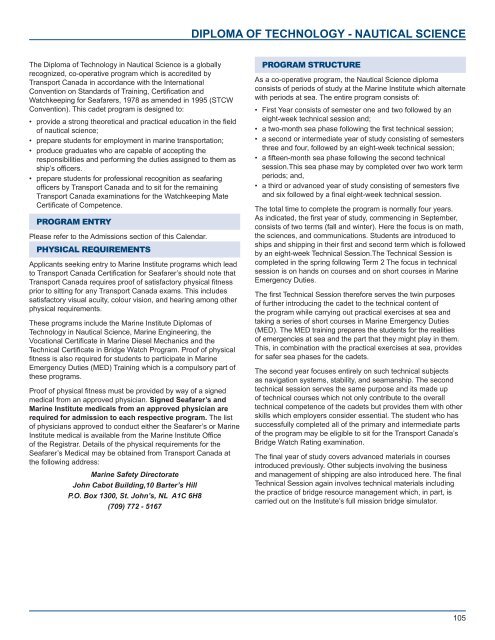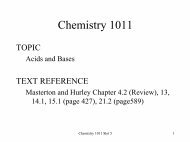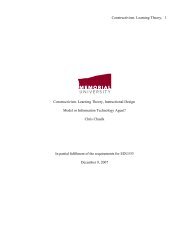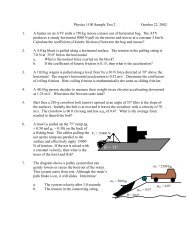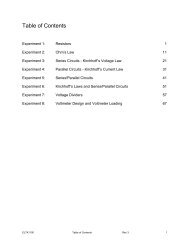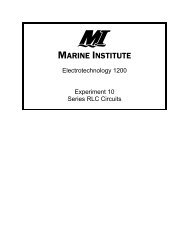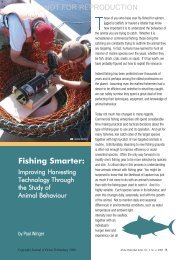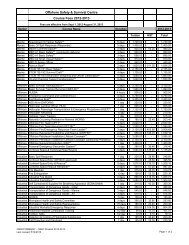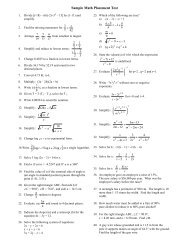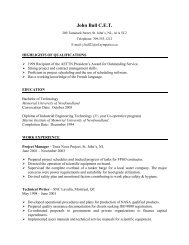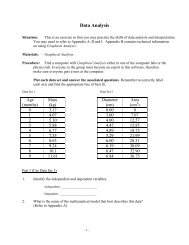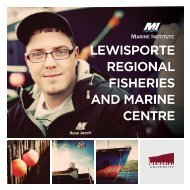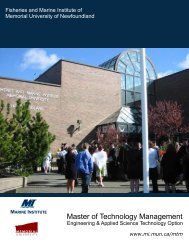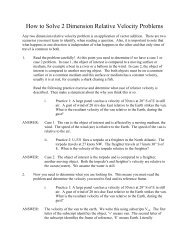Academic Calendar - Fisheries and Marine Institute - Memorial ...
Academic Calendar - Fisheries and Marine Institute - Memorial ...
Academic Calendar - Fisheries and Marine Institute - Memorial ...
Create successful ePaper yourself
Turn your PDF publications into a flip-book with our unique Google optimized e-Paper software.
DIPLOMA OF TECHNOLOGY - NAUTICAL SCIENCE<br />
The Diploma of Technology in Nautical Science is a globally<br />
recognized, co-operative program which is accredited by<br />
Transport Canada in accordance with the International<br />
Convention on St<strong>and</strong>ards of Training, Certification <strong>and</strong><br />
Watchkeeping for Seafarers, 1978 as amended in 1995 (STCW<br />
Convention). This cadet program is designed to:<br />
• provide a strong theoretical <strong>and</strong> practical education in the field<br />
of nautical science;<br />
• prepare students for employment in marine transportation;<br />
• produce graduates who are capable of accepting the<br />
responsibilities <strong>and</strong> performing the duties assigned to them as<br />
ship’s officers.<br />
• prepare students for professional recognition as seafaring<br />
officers by Transport Canada <strong>and</strong> to sit for the remaining<br />
Transport Canada examinations for the Watchkeeping Mate<br />
Certificate of Competence.<br />
PROGRAM ENTRY<br />
Please refer to the Admissions section of this <strong>Calendar</strong>.<br />
PHYSICAL REQUIREMENTS<br />
Applicants seeking entry to <strong>Marine</strong> <strong>Institute</strong> programs which lead<br />
to Transport Canada Certification for Seafarer’s should note that<br />
Transport Canada requires proof of satisfactory physical fitness<br />
prior to sitting for any Transport Canada exams. This includes<br />
satisfactory visual acuity, colour vision, <strong>and</strong> hearing among other<br />
physical requirements.<br />
These programs include the <strong>Marine</strong> <strong>Institute</strong> Diplomas of<br />
Technology in Nautical Science, <strong>Marine</strong> Engineering, the<br />
Vocational Certificate in <strong>Marine</strong> Diesel Mechanics <strong>and</strong> the<br />
Technical Certificate in Bridge Watch Program. Proof of physical<br />
fitness is also required for students to participate in <strong>Marine</strong><br />
Emergency Duties (MED) Training which is a compulsory part of<br />
these programs.<br />
Proof of physical fitness must be provided by way of a signed<br />
medical from an approved physician. Signed Seafarer’s <strong>and</strong><br />
<strong>Marine</strong> <strong>Institute</strong> medicals from an approved physician are<br />
required for admission to each respective program. The list<br />
of physicians approved to conduct either the Seafarer’s or <strong>Marine</strong><br />
<strong>Institute</strong> medical is available from the <strong>Marine</strong> <strong>Institute</strong> Office<br />
of the Registrar. Details of the physical requirements for the<br />
Seafarer’s Medical may be obtained from Transport Canada at<br />
the following address:<br />
<strong>Marine</strong> Safety Directorate<br />
John Cabot Building,10 Barter’s Hill<br />
P.O. Box 1300, St. John’s, NL A1C 6H8<br />
(709) 772 - 5167<br />
PROGRAM STRUCTURE<br />
As a co-operative program, the Nautical Science diploma<br />
consists of periods of study at the <strong>Marine</strong> <strong>Institute</strong> which alternate<br />
with periods at sea. The entire program consists of:<br />
• First Year consists of semester one <strong>and</strong> two followed by an<br />
eight-week technical session <strong>and</strong>;<br />
• a two-month sea phase following the first technical session;<br />
• a second or intermediate year of study consisting of semesters<br />
three <strong>and</strong> four, followed by an eight-week technical session;<br />
• a fifteen-month sea phase following the second technical<br />
session.This sea phase may by completed over two work term<br />
periods; <strong>and</strong>,<br />
• a third or advanced year of study consisting of semesters five<br />
<strong>and</strong> six followed by a final eight-week technical session.<br />
The total time to complete the program is normally four years.<br />
As indicated, the first year of study, commencing in September,<br />
consists of two terms (fall <strong>and</strong> winter). Here the focus is on math,<br />
the sciences, <strong>and</strong> communications. Students are introduced to<br />
ships <strong>and</strong> shipping in their first <strong>and</strong> second term which is followed<br />
by an eight-week Technical Session.The Technical Session is<br />
completed in the spring following Term 2 The focus in technical<br />
session is on h<strong>and</strong>s on courses <strong>and</strong> on short courses in <strong>Marine</strong><br />
Emergency Duties.<br />
The first Technical Session therefore serves the twin purposes<br />
of further introducing the cadet to the technical content of<br />
the program while carrying out practical exercises at sea <strong>and</strong><br />
taking a series of short courses in <strong>Marine</strong> Emergency Duties<br />
(MED). The MED training prepares the students for the realities<br />
of emergencies at sea <strong>and</strong> the part that they might play in them.<br />
This, in combination with the practical exercises at sea, provides<br />
for safer sea phases for the cadets.<br />
The second year focuses entirely on such technical subjects<br />
as navigation systems, stability, <strong>and</strong> seamanship. The second<br />
technical session serves the same purpose <strong>and</strong> its made up<br />
of technical courses which not only contribute to the overall<br />
technical competence of the cadets but provides them with other<br />
skills which employers consider essential. The student who has<br />
successfully completed all of the primary <strong>and</strong> intermediate parts<br />
of the program may be eligible to sit for the Transport Canada’s<br />
Bridge Watch Rating examination.<br />
The final year of study covers advanced materials in courses<br />
introduced previously. Other subjects involving the business<br />
<strong>and</strong> management of shipping are also introduced here. The final<br />
Technical Session again involves technical materials including<br />
the practice of bridge resource management which, in part, is<br />
carried out on the <strong>Institute</strong>’s full mission bridge simulator.<br />
105


